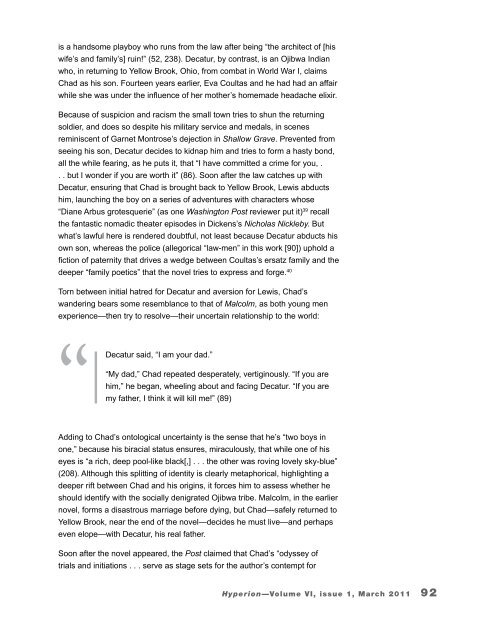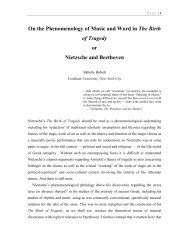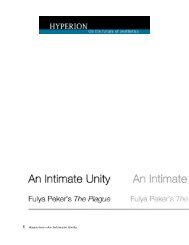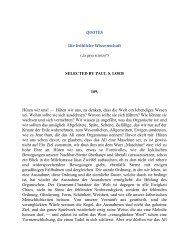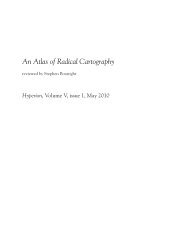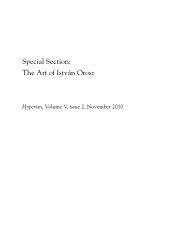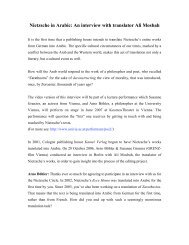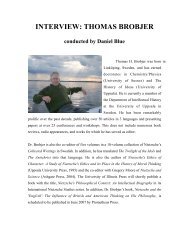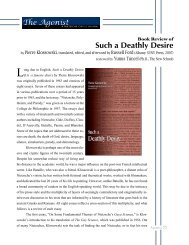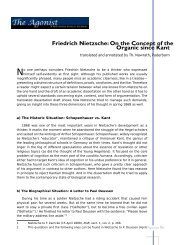Hyperion - Nietzsche Circle
Hyperion - Nietzsche Circle
Hyperion - Nietzsche Circle
You also want an ePaper? Increase the reach of your titles
YUMPU automatically turns print PDFs into web optimized ePapers that Google loves.
is a handsome playboy who runs from the law after being “the architect of [his<br />
wife’s and family’s] ruin!” (52, 238). Decatur, by contrast, is an Ojibwa Indian<br />
who, in returning to Yellow Brook, Ohio, from combat in World War I, claims<br />
Chad as his son. Fourteen years earlier, Eva Coultas and he had had an affair<br />
while she was under the influence of her mother’s homemade headache elixir.<br />
Because of suspicion and racism the small town tries to shun the returning<br />
soldier, and does so despite his military service and medals, in scenes<br />
reminiscent of Garnet Montrose’s dejection in Shallow Grave. Prevented from<br />
seeing his son, Decatur decides to kidnap him and tries to form a hasty bond,<br />
all the while fearing, as he puts it, that “I have committed a crime for you, .<br />
. . but I wonder if you are worth it” (86). Soon after the law catches up with<br />
Decatur, ensuring that Chad is brought back to Yellow Brook, Lewis abducts<br />
him, launching the boy on a series of adventures with characters whose<br />
“Diane Arbus grotesquerie” (as one Washington Post reviewer put it) 39 recall<br />
the fantastic nomadic theater episodes in Dickens’s Nicholas Nickleby. But<br />
what’s lawful here is rendered doubtful, not least because Decatur abducts his<br />
own son, whereas the police (allegorical “law-men” in this work [90]) uphold a<br />
fiction of paternity that drives a wedge between Coultas’s ersatz family and the<br />
deeper “family poetics” that the novel tries to express and forge. 40<br />
Torn between initial hatred for Decatur and aversion for Lewis, Chad’s<br />
wandering bears some resemblance to that of Malcolm, as both young men<br />
experience—then try to resolve—their uncertain relationship to the world:<br />
“<br />
Decatur said, “I am your dad.”<br />
“My dad,” Chad repeated desperately, vertiginously. “If you are<br />
him,” he began, wheeling about and facing Decatur. “If you are<br />
my father, I think it will kill me!” (89)<br />
Adding to Chad’s ontological uncertainty is the sense that he’s “two boys in<br />
one,” because his biracial status ensures, miraculously, that while one of his<br />
eyes is “a rich, deep pool-like black[,] . . . the other was roving lovely sky-blue”<br />
(208). Although this splitting of identity is clearly metaphorical, highlighting a<br />
deeper rift between Chad and his origins, it forces him to assess whether he<br />
should identify with the socially denigrated Ojibwa tribe. Malcolm, in the earlier<br />
novel, forms a disastrous marriage before dying, but Chad—safely returned to<br />
Yellow Brook, near the end of the novel—decides he must live—and perhaps<br />
even elope—with Decatur, his real father.<br />
Soon after the novel appeared, the Post claimed that Chad’s “odyssey of<br />
trials and initiations . . . serve as stage sets for the author’s contempt for<br />
<strong>Hyperion</strong>—Volume VI, issue 1, March 2011 92


